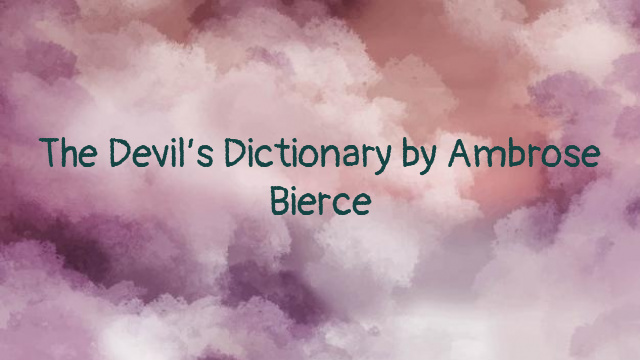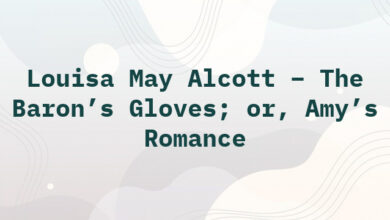
The Devil’s Dictionary by Ambrose Bierce
Originally published as The Cynic’s Word Book, Ambrose Bierce’s wickedly satirical “reference book” was retitled The Devil’s Dictionary in 1911.
Preface
The Devil’s Dictionary was begun in a weekly paper in 1881, and was continued in a desultory way at long intervals until 1906. In that year a large part of it was published in covers with the title The Cynic’s Word Book, a name which the author had not the power to reject or happiness to approve. To quote the publishers of the present work: “This more reverent title had previously been forced upon him by the religious scruples of the last newspaper in which a part of the work had appeared, with the natural consequence that when it came out in covers the country already had been flooded by its imitators with a score of ‘cynic’ books — The Cynic’s This, The Cynic’s That, and The Cynic’s Other. Most of these books were merely stupid, though some of them added the distinction of silliness. Among them, they brought the word “cynic” into disfavor so deep that any book bearing it was discredited in advance of publication. Meantime, too, some of the enterprising humorists of the country had helped themselves to such parts of the work as served their needs, and many of its definitions, anecdotes, phrases and so forth, had become more or less current in popular speech. This explanation is made, not with any pride of priority in trifles, but in simple denial of possible charges of plagiarism, which is no trifle. In merely resuming his own the author hopes to be held guiltless by those to whom the work is addressed — enlightened souls who prefer dry wines to sweet, sense to sentiment, wit to humor and clean English to slang. A conspicuous, and it is hope not unpleasant, feature of the book is its abundant illustrative quotations from eminent poets, chief of whom is that learned and ingenius cleric, Father Gassalasca Jape, S.J., whose lines bear his initials. To Father Jape’s kindly encouragement and assistance the author of the prose text is greatly indebted.
A life on the ocean wave,
A home on the rolling deep,
For the spark the nature gave
I have there the right to keep.
They give me the cat-o'-nine
Whenever I go ashore.
Then ho! for the flashing brine --
I'm a natural commodore!
Dodle
substantial welfare.
Ah, punster, would my lot were cast,
Where the cobbler is unknown,
So that I might forget his last
And hear your own.
Gargo Repsky
Once Law was sitting on the bench,
And Mercy knelt a-weeping.
"Clear out!" he cried, "disordered wench!
Nor come before me creeping.
Upon your knees if you appear,
'Tis plain your have no standing here."
Then Justice came. His Honor cried:
"Your status? -- devil seize you!"
"Amica curiae," she replied --
"Friend of the court, so please you."
"Begone!" he shouted -- "there's the door --
I never saw your face before!"
G.J.
Hail, holy Lead! -- of human feuds the great
And universal arbiter; endowed
With penetration to pierce any cloud
Fogging the field of controversial hate,
And with a sift, inevitable, straight,
Searching precision find the unavowed
But vital point. Thy judgment, when allowed
By the chirurgeon, settles the debate.
O useful metal! -- were it not for thee
We'd grapple one another's ears alway:
But when we hear thee buzzing like a bee
We, like old Muhlenberg, "care not to stay."
And when the quick have run away like pellets
Jack Satan smelts the dead to make new bullets.
The electric light invades the dunnest deep of Hades.
Cries Pluto, 'twixt his snores: "O tempora! O mores!"
It should be explained that Mrs. Silcox does not undertake to teach pronunciation of the Greek and Latin tongues. Leonine verses are so called in honor of a poet named Leo, whom prosodists appear to find a pleasure in believing to have been the first to discover that a rhyming couplet could be run into a single line.
God said: "Let Spirit perish into Form,"
And lexicographers arose, a swarm!
Thought fled and left her clothing, which they took,
And catalogued each garment in a book.
Now, from her leafy covert when she cries:
"Give me my clothes and I'll return," they rise
And scan the list, and say without compassion:
"Excuse us -- they are mostly out of fashion."
Sigismund Smith
The rising People, hot and out of breath,
Roared around the palace: "Liberty or death!"
"If death will do," the King said, "let me reign;
You'll have, I'm sure, no reason to complain."
Martha Braymance
"Life's not worth living, and that's the truth,"
Carelessly caroled the golden youth.
In manhood still he maintained that view
And held it more strongly the older he grew.
When kicked by a jackass at eighty-three,
"Go fetch me a surgeon at once!" cried he.
Han Soper
'Twas a pair of boots that the lady bought,
And the salesman laced them tight
To a very remarkable height --
Higher, indeed, than I think he ought --
Higher than can be right.
For the Bible declares -- but never mind:
It is hardly fit
To censure freely and fault to find
With others for sins that I'm not inclined
Myself to commit.
Each has his weakness, and though my own
Is freedom from every sin,
It still were unfair to pitch in,
Discharging the first censorious stone.
Besides, the truth compels me to say,
The boots in question were made that way.
As he drew the lace she made a grimace,
And blushingly said to him:
"This boot, I'm sure, is too high to endure,
It hurts my -- hurts my -- limb."
The salesman smiled in a manner mild,
Like an artless, undesigning child;
Then, checking himself, to his face he gave
A look as sorrowful as the grave,
Though he didn't care two figs
For her paints and throes,
As he stroked her toes,
Remarking with speech and manner just
Befitting his calling: "Madam, I trust
That it doesn't hurt your twigs."
B. Percival Dike
'Tis said by divers of the scholar-men
That poor Salmasius died of Milton's pen.
Alas! we cannot know if this is true,
For reading Milton's wit we perish too.
Pleased with the speech, the king commanded that the mirror be conveyed to the courtier's palace; but after, having gone thither without apprisal, he found it in an apartment where was naught but idle lumber. And the mirror was dimmed with dust and overlaced with cobwebs. This so angered him that he fisted it hard, shattering the glass, and was sorely hurt. Enraged all the more by this mischance, he commanded that the ungrateful courtier be thrown into prison, and that the glass be repaired and taken back to his own palace; and this was done. But when the king looked again on the mirror he saw not his image as before, but only the figure of a crowned ass, having a bloody bandage on one of its hinder hooves -- as the artificers and all who had looked upon it had before discerned but feared to report. Taught wisdom and charity, the king restored his courtier to liberty, had the mirror set into the back of the throne and reigned many years with justice and humility; and one day when he fell asleep in death while on the throne, the whole court saw in the mirror the luminous figure of an angel, which remains to this day.
Miss Sallie Ann Splurge, of her own accord,
Wedded a wandering English lord --
Wedded and took him to dwell with her "paw,"
A parent who throve by the practice of Draw.
Lord Cadde I don't hesitate to declare
Unworthy the father-in-legal care
Of that elderly sport, notwithstanding the truth
That Cadde had renounced all the follies of youth;
For, sad to relate, he'd arrived at the stage
Of existence that's marked by the vices of age.
Among them, cupidity caused him to urge
Repeated demands on the pocket of Splurge,
Till, wrecked in his fortune, that gentleman saw
Inadequate aid in the practice of Draw,
And took, as a means of augmenting his pelf,
To the business of being a lord himself.
His neat-fitting garments he wilfully shed
And sacked himself strangely in checks instead;
Denuded his chin, but retained at each ear
A whisker that looked like a blasted career.
He painted his neck an incarnadine hue
Each morning and varnished it all that he knew.
The moony monocular set in his eye
Appeared to be scanning the Sweet Bye-and-Bye.
His head was enroofed with a billycock hat,
And his low-necked shoes were aduncous and flat.
In speech he eschewed his American ways,
Denying his nose to the use of his A's
And dulling their edge till the delicate sense
Of a babe at their temper could take no offence.
His H's -- 'twas most inexpressibly sweet,
The patter they made as they fell at his feet!
Re-outfitted thus, Mr. Splurge without fear
Began as Lord Splurge his recouping career.
Alas, the Divinity shaping his end
Entertained other views and decided to send
His lordship in horror, despair and dismay
From the land of the nobleman's natural prey.
For, smit with his Old World ways, Lady Cadde
Fell -- suffering Caesar! -- in love with her dad!
G.J.
Here Huntington's ashes long have lain
Whose loss is our eternal gain,
For while he exercised all his powers
Whatever he gained, the loss was ours.
I sit astride Parnassus with my lyre,
And pick with care the disobedient wire.
That stupid shepherd lolling on his crook
With deaf attention scarcely deigns to look.
I bide my time, and it shall come at length,
When, with a Titan's energy and strength,
I'll grab a fistful of the strings, and O,
The word shall suffer when I let them go!
Farquharson Harris




